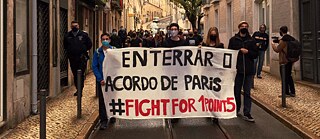Paris Agreement
Are governments doing enough?

The results of climate research are clear. But are they also reflected in the political actions of governments and institutions around the world? A reality check.
By Matilde Alvim
This question arises out of the indisputable evidence of environmental degradation triggered by anthropogenic greenhouse gas emissions and accelerated by the global spread of a socio-economic system that puts money before life. As explained in the previous article, the results from climate science are clear and there is no time to lose. So, with collapse looming, what are institutions and governments doing to stem the climate crisis and establish a new paradigm?
We can first take a look at the Paris Agreement, which celebrated its 5th anniversary in December 2020. It was signed in 2015 at the UN Climate Change Conference (COP21) in Paris and was characterized by the world's nations agreeing on 2°C warming as the upper limit, with 1.5°C seen as ideal. The agreement was touted as a lifeline in the climate crisis and serves as a reference in numerous targets, official documents and the media. At the time of the signing, climate justice movements called on governments not to cross the line of a secure future by erecting giant red lines all over the city. According to BBC News, protests spread across the globe during COP21, from the Marshall Islands to glaciers in Chile and Colombia to the equator in Kenya.
The red line has been crossed!
But what remains half a decade later? Has the line been crossed? The answer is yes. This is already clear from the analysis of the agreement itself. Shortly after COP21, the organization ATTAC France analysed the premises agreed upon and ascertained that even if everything is followed to the letter, the agreement foresees at least 3°C of warming. Moreover, global emissions are increasing every year. Even during the first wave of the COVID-19 pandemic, reality quickly caught up with the fantasy that the "world would heal itself." In an article in the journal Nature Climate Change, researchers noted that "most of the changes observed in 2020 are likely to be temporary, as they do not represent structural changes in the economic, transport or energy systems." They thus underscore the lack of a structured response by governments that would be needed to change course in the climate crisis.Five years have passed since Paris and we are still headed for climate chaos at breakneck speed, as was made clear at the “funeral” of the Paris Agreement by the Climáximo Movement in Lisbon in December 2020. Rubén D. Manzanedo, a researcher at Harvard, compares the pandemic to the climate crisis and states that "early action is needed to avoid worst-case scenarios for both the climate crisis and pandemics.”
Need for new spectacles
No country in the world is doing enough - and European countries, whilst projecting a pioneering image, are concurrently responsible for financing fossil fuel projects all over the world. For example, research by the international collective Gastivists shows that the climatic and political disaster in Cabo Delgado, Mozambique, where communities are threatened by resource extraction and violence, is largely funded by European companies such as Total and ENI.Perhaps we are not looking through the right spectacles. Perhaps we should not be asking whether the Paris Agreement has failed or whether our governments are doing enough. Are the agreements and "promises" that emerge within this system effective in dealing even with a crisis that it has itself created?
This is a reality check and reality should determine our actions: Institutions have failed us in addressing the climate crisis. The world is not doing enough. So where do we turn? Where do we look if we want to win?
We need to change spectacles! Climáximo symbolically buried the Paris Agreement in Lisbon to launch the Glasgow Agreement, which puts civil society at the heart of action. And next week on Blog, Engage, Act we look at the climate movement in Belgium and ask again: are we winning?